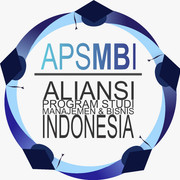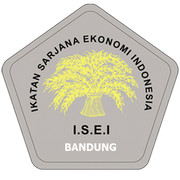PENGARUH SELF-SERVICE TECHNOLOGY QUALITY TERHADAP LOYALITAS DENGAN KEPUASAN SEBAGAI VARIABEL MEDIASI (STUDI PADA PELANGGAN MCDONALD'S DI SURABAYA)
Abstract
Recently, McDonald’s Indonesia have launched self-service technologhy by replacing manual cashier with self-ordering kiosk. To find out the impact of the self-service technologhy that have been adopted in McDonald’s Indonesia, this study proposed and tested the affect of self-service technologhy quality toward loyalty with satisfaction as mediating variable. The aim was based on the supposition that an overall quality of the self-service technologhy will influence satisfaction and loyalty toward McDonald’s that use the new technologhy. This research used 200 samples and used judgemental sampling method. Method of Data collection is done by distributing online questionnaires. The technique of data analysis used in this research is the path analysis technique. The results showed that self-service technologhy quality had a positive effect on loyalty and satisfaction proved to be a mediating variable. These results provide insights for the other enterprise to investment in the new technology in order to enhance the consumer experience, satisfaction, and loyalty.
Full Text:
PDFReferences
Ahn, J. A., & Seo, S. (2018). Consumer responses to interactive restaurant self-service technology (IRSST): The role of gadget-loving propensity. International Journal of Hospitality Management, 74(February), 109–121.
Bella, A. (2018). Mencicip Bisnis Restoran Indonesia di 2019. Retrieved January 8, 2020, from https://marketeers.com/mencicip-bisnis- restoran-indonesia-di-2019/
Carranza, R., Díaz, E., & Martín-Consuegra, D. (2018). The influence of quality on satisfaction and customer loyalty with an importance-performance map analysis: Exploring the mediating role of trust. Journal of Hospitality and Tourism Technology, 9(3), 380–396.
Demirci Orel, F., & Kara, A. (2014). Supermarket self-checkout service quality, customer satisfaction, and loyalty: Empirical evidence from an emerging market. Journal of Retailing and Consumer Services, 21(2), 118– 129.
pada-pemasaran-digital
Irawan, H. (2002). 10 prinsip kepuasan
pelanggan. Jakarta: Elex Media.
Kotler, P., & Keller, K. L. (2012). Manajemen Pemasaran (12th ed.).
Jakarta: Erlangga.
Leung, L. S. K., & Matanda, M. J. (2013).
The impact of basic human needs on the use of retailing self-service technologies: A study of self- determination theory. Journal of Retailing and Consumer Services, 20(6), 549–559.
Lin, J. S. C., & Hsieh, P. L. (2006). The role of technology readiness in customers’ perception and adoption of self-service technologies. International Journal of Service Industry Management, 17(5), 497–517.
Lovelock, C., & Gummesson, E. (2004). Whither Services Marketing?: In Search of a New Paradigm and Fresh Perspectives. Journal of Service Research, 7(1), 20–41.
Lovelock, C., Wirtz, J., & Mussry, J. (2011). Pemasaran Jasa (7th ed.). Jakarta: Erlangga.
Lupiyoadi, R. (2013). Manajemen Pemasaran Jasa (3rd ed.). Jakarta: Salemba Empat.
Meuter, M. L., Ostrom, A. L., Roundtree, R. I., & Bitner, M. J. (2000). Self-service technologies: Understanding customer satisfaction with technology-based service encounters. Journal of Marketing, 64(3), 50–64.
Oliver, R. L. (1999). Whence consumer loyalty? Journal of Marketing, 63(SUPPL.), 33–44.
Pemanfaatan Teknologi di Era Revolusi Industri 4.0. (2019). Retrieved January 6, 2020, from Kompas website: https://www.kompasiana.com/akhyabdu l3437/5cec1aae95760e406a4c5e78/pem anfaatan-teknologi-di-era-revolusi- industri-4-0?page=all
Redaktur. (2019a). 5 Teknologi Restoran Terbaru yang Wajib Diketahui Pemilik Restoran. Retrieved January 7, 2020, from https://intermezzo.id/teknologi-
Fast
Food Indonesia to launch self order kiosks. (2018). Retrieved January 22, 2020, from IDN Financials website: https://www.idnfinancials.com/archive/i d/news/18617/Fast-Food-Indonesia-to- launch-self-order-kiosks
Gaffar, V. (2007). Customer Relationship Management and Marketing Public Relation. Bandung: Alfabeta.
Ghozali, I. (2016). Aplikasi Analisis Multivariete dengan Program IBM SPSS 23 (Ke Delapan). Semarang: Badan Penerbit Universitas Diponegoro.
Griffin, J. (2005). Customer Loyalty. Jakarta: Erlangga.
Han, H., & Ryu, K. (2009). The roles of the physical environment, price perception, and customer satisfaction in determining customer loyalty in the restaurant industry. Journal of Hospitality and Tourism Research, 33(4), 487–510.
Imarketology. (2020). Dampak Revolusi Industri 4.0 pada Pemasaran Digital. Retrieved March 20, 2020, from Marketing Craft website: https://marketingcraft.getcraft.com/id- articles/dampak-revolusi-industri-4-0-
restoran-terbaru/
Redaktur. (2019b). Mengenal Teknologi Self
Order dan Manfaatnya untuk Bisnis Restoran Anda. Retrieved February 2, 2020, from https://interactive.co.id/blog/mengenal- teknologi-self-order-dan-manfaatnya- untuk-efisiensi-bisnis-restoran-183.html
Restoran yang Paling Diminati Orang Indonesia adalah. (2018). Retrieved January 20, 2020, from Kompas website: https://travel.kompas.com/read/2018/09/ 15/070000827/restoran-yang-paling- diminati-orang-indonesia-adalah-
Samengon, L., Amri, P., Hashim, N., Sabri, K. N., Yahya, S., Muhammad, N. H., ... Kumar V elayuthan, S. (2016). Factors affecting self-service technology towards intention to adopt the technology among consumer in the foodservice industry. International Journal of Disaster Recovery and Business Continuity, 11(1), 2766–2774.
Self-order kiosk McDonald’s. (2020). Retrieved February 16, 2020, from McDonald’s Indonesia website: https://mcdonalds.co.id/
Shahid Iqbal, M., Ul Hassan, M., & Habibah, U. (2018). Impact of self-service technology (SST) service quality on customer loyalty and behavioral intention: The mediating role of customer satisfaction. Cogent Business and Management, 5(1), 1–23.
Sugiyono. (2016). Metode Penelitian Kuantitatif Kualitatif dan Kombinasi (Mixed Methods). Bandung: Alfabeta.
Sumarwan, U. (2015). Perilaku Konsumen (2nd ed.). Bogor: Ghalia Indonesia. Tjiptono, F. (2014). Pemasaran Jasa.
Yogyakarta: Andi.
Top Brand Index Fase 2 2017. (2017).
Retrieved March 13, 2020, from Frontier Group website: https://www.topbrand-award.com/top- brand-index/?tbi_index=Top Brand&tbi_year=2017
Top Brand Index Fase 2 2018. (2018). Retrieved March 14, 2020, from Frontier Group website: https://www.topbrand-award.com/top- brand-index/?tbi_index=Top Brand&tbi_year=2018
Top Brand Index Fase 2 2019. (2019). Retrieved March 15, 2020, from Frontier Group website: https://www.topbrand-award.com/top- brand-index/?tbi_index=Top Brand&tbi_year=2019
Top Branf Index Fase 2 2016. (2016). Retrieved March 12, 2020, from Frontier Group website: https://www.topbrand-award.com/top- brand-index/?tbi_index=Top Brand&tbi_year=2016
Tujuh Lokasi yang Menerapkan Sistem Self Service di Indonesia. (2019). Retrieved January 18, 2020, from https://www.winnetnews.com/post/7- lokasi-yang-menerapkan-sistem-self- service-di-indonesia
Walker, R. H., Craig-Lees, M., Hecker, R., & Francis, H. (2002). Technology-enabled service delivery An investigation of reasons affecting customer adoption and rejection. International Journal of Service Industry Management, 16(4), 357–372.
Yuliani, I. D. A. E. (2018). Self-Service Technology Berbasis Smartphone Device pada Sistem Pemesanan Menu Makanan. Proceeding Seminar Nasional Sistem Informasi Dan Teknologi Informasi, 115–120.
DOI: https://doi.org/10.17509/image.v10i1.31448
Refbacks
- There are currently no refbacks.
Copyright (c) 2021 Nuraini Rosyidah, Anik Lestari Andjarwati
Image : Jurnal Riset Manajemen is licensed under a Creative Commons Attribution-ShareAlike 4.0 International License
View My Stats



